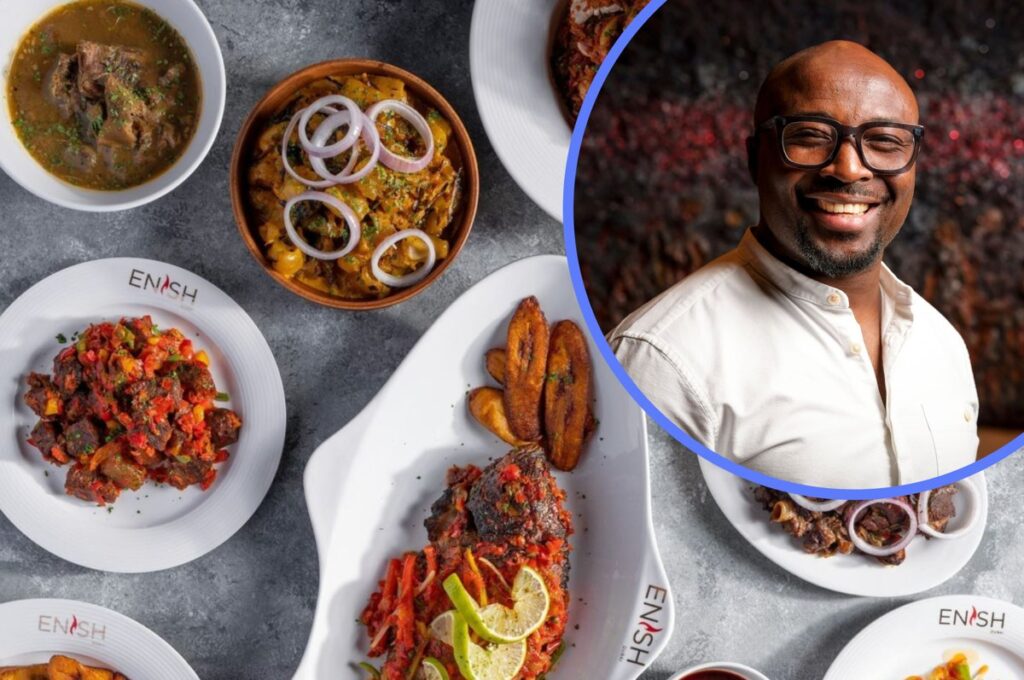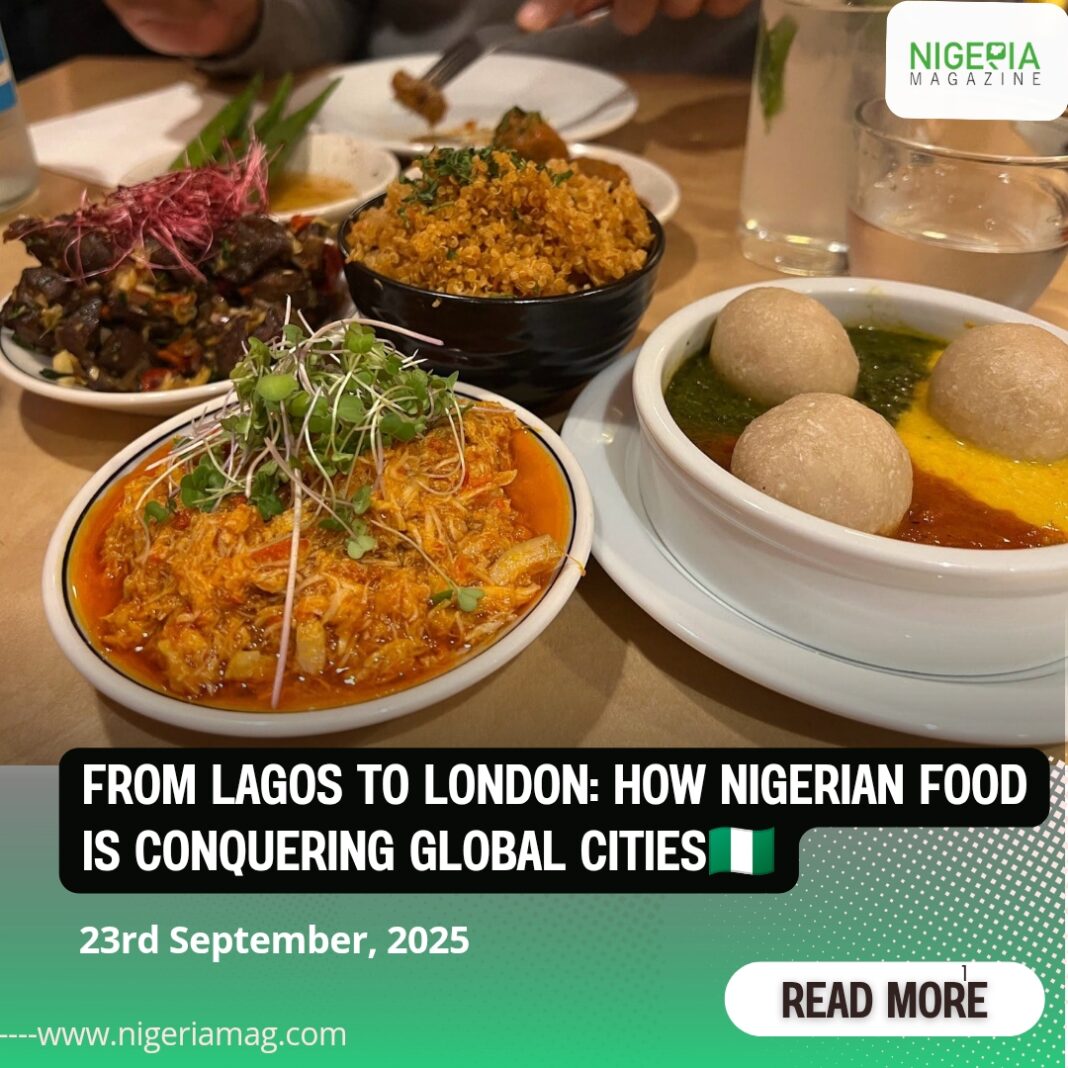In the last decade, Nigerian cuisine has begun a remarkable journey from the bustling streets of Lagos to the dining tables of global cities like London, New York, and Dubai. What was once a culinary experience confined largely to West Africa is now winning hearts, sparking conversations, and reshaping global food culture. The rise of Nigerian food abroad is not just a story of flavours; it is also a narrative of migration, identity, cultural pride, and entrepreneurial innovation.
The Global Appetite for Nigerian Flavours
Nigerian cuisine is bold, vibrant, and unapologetically rich. Dishes like jollof rice, suya, egusi soup, and puff-puff have become emblematic of the country’s culinary identity. Each dish tells a story: jollof rice, with its smoky aroma and tomato-based richness, is often at the centre of celebratory feasts; suya, the spiced, grilled meat skewer, speaks to Nigeria’s deep love of communal street food culture; and soups like egusi and ogbono reflect both the resourcefulness and agricultural wealth of the land.

As global diners grow more adventurous, Nigerian food offers a perfect blend of comfort and excitement. Its reliance on spices, herbs, and layered flavours resonates with international audiences already familiar with Indian, Thai, or Middle Eastern cuisines. In an era where consumers are looking for authentic, soulful meals, Nigerian cuisine fits the bill perfectly.
Diaspora and the Roots of Expansion
The Nigerian diaspora has been instrumental in spreading the nation’s culinary traditions. Cities like London, with one of the largest Nigerian communities outside Africa, have become hubs of West African dining. From Peckham to Brixton, restaurants and street stalls are introducing both Nigerians abroad and curious food lovers to the authentic flavours of home.
In the United States, Nigerian restaurants are emerging in cities such as Houston, Atlanta, and New York, driven by the growing African immigrant population. These establishments often serve as more than eateries—they are cultural centres where food becomes a vehicle for memory, nostalgia, and belonging.
Nigerian Food in London: A Case Study
London’s food scene has always been a melting pot, but in recent years Nigerian cuisine has taken on a new prominence. High-profile pop-ups, supper clubs, and fine dining experiences have introduced Nigerian dishes to mainstream audiences. Chefs like Lopè Ariyo and Tokunbo Koiki have been at the forefront, using food as a bridge between cultures.
Jollof rice, often dubbed the “pride of West Africa,” has become something of a culinary ambassador. Londoners can now find it not only in Nigerian restaurants but also at music festivals, food markets, and even as fusion dishes in trendy eateries. The much-debated “Jollof Wars” between Nigeria and Ghana have also amplified its appeal, turning the dish into a cultural talking point and a symbol of pride.
The Role of Social Media and Pop Culture
Social media has accelerated the rise of Nigerian food globally. Platforms like TikTok, Instagram, and YouTube are filled with cooking tutorials, food reviews, and vibrant visuals of Nigerian meals. Influencers and chefs share recipes that demystify the cooking process, making Nigerian food more accessible to non-Africans.
Pop culture, too, has played its part. With the global success of Afrobeats, Nollywood, and Nigerian literature, there is a growing curiosity about Nigerian culture as a whole. Food is naturally part of this cultural export. Celebrities and musicians often highlight their favourite dishes, further piquing international interest.
From Street Food to Fine Dining
What makes Nigerian cuisine particularly compelling is its adaptability. Street food staples like puff-puff and akara (bean cakes) are making their way into trendy food trucks in Brooklyn and Shoreditch. At the same time, high-end restaurants are experimenting with fine-dining versions of Nigerian classics. For instance, a tasting menu might reimagine egusi soup with modern plating while preserving its core flavours. This duality allows Nigerian cuisine to appeal to diverse audiences—those seeking casual comfort and those in search of sophisticated, innovative experiences.
Challenges on the Global Stage
Despite its growing popularity, Nigerian cuisine still faces challenges. Ingredient accessibility remains a hurdle. Many traditional spices, yams, and leaves are not readily available outside Africa, forcing chefs to either import or find substitutes. This can affect authenticity and cost.
Additionally, Nigerian food’s richness and intensity sometimes challenge Western palates used to milder flavours. However, chefs and food entrepreneurs are finding creative ways to introduce flavours gradually—through fusion dishes, smaller portions, or by educating diners about the cultural significance of certain meals.
Economic and Cultural Impact
The globalisation of Nigerian cuisine is more than a food trend—it is an economic opportunity. The rise of Nigerian restaurants, food delivery services, packaged goods (such as chin chin, plantain chips, and spice mixes), and catering businesses contribute to both local economies abroad and Nigeria’s soft power on the world stage.
Furthermore, food diplomacy plays a role. Just as sushi became synonymous with Japan and tacos with Mexico, Nigerian cuisine has the potential to become a defining marker of the country’s global identity. Governments, cultural institutions, and entrepreneurs are increasingly recognising this potential and supporting initiatives that showcase Nigerian gastronomy abroad.
The Future: From Lagos to the World
Looking ahead, Nigerian cuisine’s trajectory is set to climb even higher. As global cities continue to embrace diversity in their food scenes, Nigerian food stands to benefit from this openness. The growth of Afro-fusion dining, the establishment of pan-African culinary festivals, and increased investment in food exports all point to a bright future.
In Lagos, the culinary innovation happening at home continues to inspire chefs abroad. The city’s dynamic food culture—where traditional recipes coexist with experimental creations—provides a blueprint for how Nigerian food can evolve globally without losing its essence.
From Lagos to London, and from street markets to Michelin-starred restaurants, Nigerian cuisine is making its mark. It is not just the food itself that captivates—it is the stories behind it, the communities it represents, and the pride it carries. As Nigerian food conquers global cities, it does so not by diluting its identity but by confidently presenting its bold flavours to the world.
In the process, Nigerian cuisine is achieving something greater than global recognition: it is redefining how we understand cultural exchange, proving that food is not just sustenance, but also memory, identity, and a bridge between worlds.


